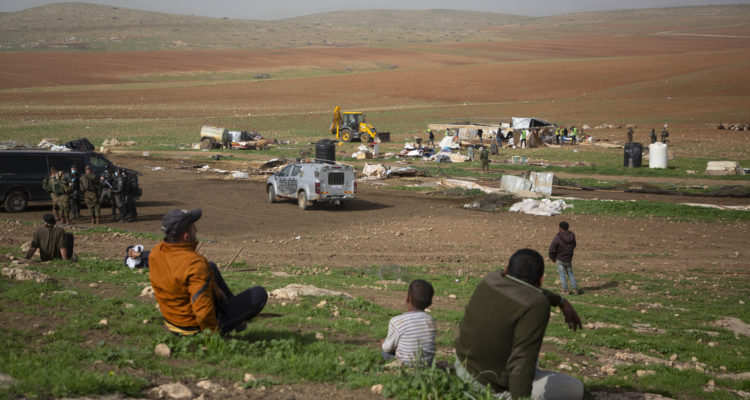“The Palestinians have been here for thousands of years,” claimed Prime Minister Mohammad Shtayyeh.
By Josh Plank, World Israel News
Israel faced international condemnation for demolishing the ancient Bedouin village of Khirbet Humsa in Samaria last week. However, evidence suggests that the village was not ancient, the structures were not Bedouin, and they were illegally erected on a military firing range.
“Our presence in Khirbet Humsa al-Foqa is a loud message to the occupation that we will remain here. The #Palestinians have been here for thousands of years,” Mohammad Shtayyeh, prime minister of the Palestinian Authority (PA), tweeted Friday.
Our presence in Khirbet Humsa al-Foqa is a loud message to the occupation that we will remain here. The #Palestinians have been here for thousands of years.
— Dr. Mohammad Shtayyeh د. محمد اشتية (@DrShtayyeh) February 5, 2021
Despite Shtayyeh’s claim, other sources indicate that Khirbet Humsa may be far less ancient.
“I have never seen anything like this in the 10 years that I lived in the place,” said resident Anas Awawdeh after a similar demolition at the site in Nov. 2020, according to the PA’s Wafa news agency.
The Regavim Movement, an Israeli NGO focused on land-use issues, confirmed via satellite imagery that Awawdeh’s estimation of Khirbet Humsa’s age is the more accurate one, although still an exaggeration.
According to Regavim, the site has been an active IDF training ground since 1972, and only one structure was visible there in 2013.
In an image from 2019, several structures can be seen, “complete with European donors’ symbols,” the organization said.
The existence of European Union (EU) structures at the site was confirmed by the EU in an official condemnation statement issued on Tuesday.
“In recent days, Israeli forces confiscated and demolished a total of 46 structures belonging to Palestinian families in Hamsa al-Foqa in the northern Jordan Valley. This was the second time in which structures in the community were demolished following another major demolition carried out on 3 November 2020,” the statement said.
“Structures funded by the EU and EU Member States were affected in both cases,” said the EU.
The EU called on Israel to halt demolitions and stated its firm opposition to Israel’s settlement policy which the EU sees as “illegal under international law and as an impediment to a viable two-state solution.”
Heads of Mission and Reps from the EU, Member States,& like-minded countries visited for the 2nd time in 3 months the Humsa Al Bqai’a community near Tubas located in Firing Zone 916 in close proximity to 2 Israeli settlements. pic.twitter.com/iZPIfyx7jX
— EU and Palestinians (@EUpalestinians) February 5, 2021
In a statement on social media Friday, Regavim attempted to shed some light on this murky situation.
“Although this isn’t a Regavim case, the pattern has been copy-pasted from other IDF firing zones: Bedouin squatters pitch tents in a live-fire training ground. At first the IDF adopts a live-and-let-live policy, and warns them to clear out of the area each time an exercise is scheduled, which they do,” said Regavim.
“Then the Palestinian Authority jumps in, the anarchists, the ‘human rights’ groups, the UN – the whole circus. They fabricate a name for this ‘historic village’ that never existed, they claim they’ve been there since the dawn of time, and Israel is painted as a cruel occupier if it dares use state land for state purposes,” the organization said.
Regavim said that the area is under full Israeli jurisdiction and anything built upon it without a permit is illegal and subject to immediate demolition.
“Perhaps the Palestinian Authority would serve these people better by enabling them to live somewhere legal, somewhere no Israeli permits are required, such as the 63% of Areas A and B that are completely empty and available for whatever use they choose,” the organization said.





